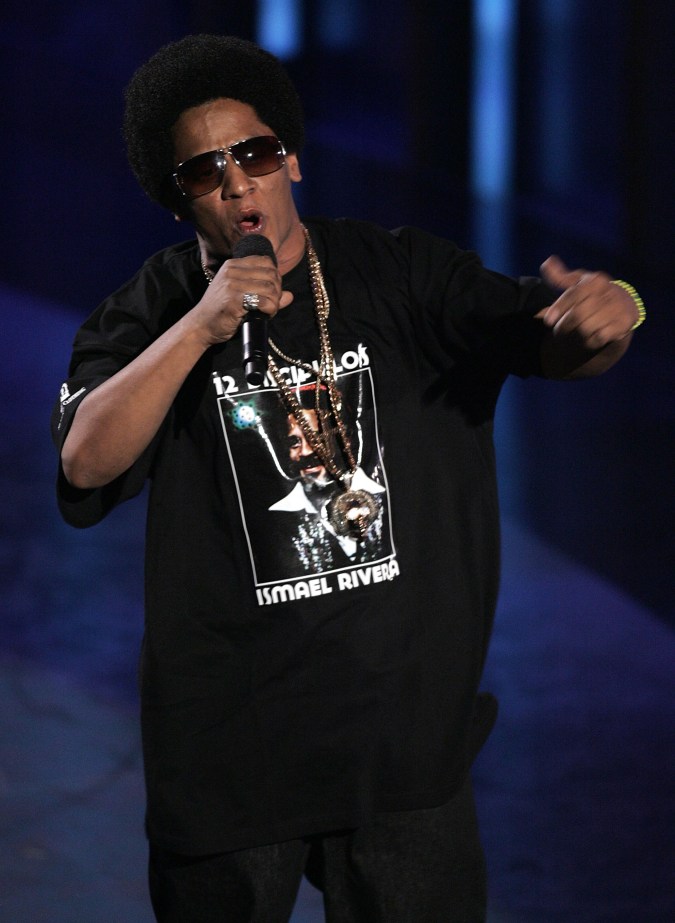“Despite the genre’s dizzying rise, the Latin [Recording Academy] has not embraced it,” English-American music critic Kelefa Sanneh wrote for the New York Times in 2005 regarding reggaeton. 15 years later, not much has changed.
Though there’s likely an elaborate amount of planning going into commemorating the 20th anniversary of the Latin Grammys, there’s also a good chance several of your favorites may opt out of performing or showing face all together. The trickling in of nominees exposed holes and patterns as old as time; but this year, there’s a twist.
Daddy Yankee and Pina Records label founder Rafael Pina, took to social media to voice their opinions on Tuesday night, and started a movement that screams cabriación. The fire-lighting graphic now circulating the net depicts a blood-stained red X over the Latin Grammy icon with the words “Sin reggaeton no hay Latin Grammy” around it.
In less than 24 hours, artists like Tego Calderon, Farruko (in a now-deleted post), Brytiago, and Nicky Jam echoed the sentiment, just to name a few. Pina went as far as to compare the domino effect to Puerto Rico’s uprising and removal of Ricky Roselló. “People came together with one goal, and that’s what the [urbano] genre is doing now,” he warned on IGTV.

In 2004, the Latin Grammys first swapped the “Best Rap/Hip-Hop Album” award identifier for what we now know as Best Urban Music Album. Vico C would take home the gramophone that year, and Daddy Yankee followed on the next. Since then, Yankee has won only six of the 25 nominations he’s received, with over a ten year gap between his first (for Barrio Fino in 2005) and his second (for Despacito in 2017).
El Cangri is nominated for Best Urban/Fusion Performance this year, pero he’s all but pleased with the way the academy has treated the genre, and his colleagues. “Your platform is not [responsible] for creating this movement,” he said in his post, “This goes beyond an award.”
Balvin, nominated for Best Urban Song, thanks to his collaborations on “Caliente” and “Con Altura,” agreed. Adding his voice to this moment he claims, like most of everything he does, is something he’s doing “for the culture and the movement.”

Throughout the entire 20 year existence of the award show, Calle 13’s sibling group is the only urbano talent to win the coveted Album of the Year award. They took home the gold (or gold-plated grammium rather) in 2009 and 2011 for Los de Atras Vienen Conmigo and Entren Los Que Quieran respectively.
Since then, Nicky Jam, Balvin, ChocQuibTown and Residente (solo) have also been nominated but upset by artists in other more clean-cut genres.
Urbano encases everything from trap to reggaeton and dancehall – often living within other genres in a diluted iteration, making it ubiquitous and akin to “pop” music. It is undoubtedly the most listened to genre in Latin America and the diaspora, and the numbers speak for themselves.

According to the Grammys, based on an assessment of end-of-year numbers from music forums like Spotify, YouTube and Apple Music, urbano dominated 2018’s airwaves in Latin America, the diaspora, and beyond. J Balvin was the fourth most globally streamed artist on Spotify while Cardi B, Bad Bunny and Balvin took the No. 6 spot on Apple Music’s Global 100 for “I Like It.” Ozuna, a consistent global phenomenon who keeps breaking records left and right, was a fixture on just about every list. This year, he was awarded four Guinness World Records for achievements like most videos to reach one billion views on YouTube and most weeks at No. 1 on Billboard’s Top Latin Albums chart. His only nomination this year was in the Best Urban Song category, for “Baila, Baila, Baila.” (He’s yet to comment on urbano’s uprising being that he’s off of Instagram at the moment, working on his coming soon album that’s sure to be a hit).
Additionally (bear with me here), eight of the 10 most-viewed videos on YouTube last year were Latin songs. Each and every one was urbano.
All that to say, the genre’s impact and reach within Latin music, is undeniable.The reluctance, or negligence, to reflect that in what is titularly “the most important night for Latin music“ is likely due to a toxic mix of stubbornness and lack of representation on a granular and structural level.

To ensure representation, urbano culture-shifters will need a seat at a table, or people they see themselves reflected sitting at it. But, if like me, you’re eager to nominate yourself as tribute, I should warn you it’s not a rudimentary task, and is only for those already working in the industry. There’s a loaded list of requirements for applicants. A couple of standouts? At least 12 commercially distributed credits, and two recommendations from music professionals. But for those already making music in a professional capacity, it’s not necessarily a far reach. Voting members are responsible for parsing through hundreds of applications and, after artist’s have gone through the necessary application processes, they are the sole determiners of who ultimately stands on that stage to give their snoozy, sometimes memorable, acceptance speeches. Needless to say, they are key in determining how each year will go down in history. The process, from application to voting, is often glazed over in the conversation around inclusion, as many likely assume the academy is picking names out of a hat of favorites. It’s important artists ensure they apply prior to the deadline. As for the voting group itself, I think it’s safe to assume it looks more like a bag of aged rice than a healthy batch of sundry herbs. As Lex Borrero laid out in an Insta Story post, a lot of the people who are outraged can be a part of the change. “[We] have to ensure our opinion counts and impacts,” he pleaded.

At the onset of reggaeton’s first international wave in the early 2000s, Daddy Yankee’s spectrum-shifting album, Barrio Fino, was undeniable, earning him his first Grammy. Still, that year Bebe (a Spanish pop singer) had more nominations than Daddy Yankee (an artist I need not define). There are a number of perplexing similarities between this year and that of that cornerstone year which, in retrospect, was merely a crack in the glass ceiling rather than a complete shattering.
Firstly, this year Spanish artists Rosalía and Alejandro Sanz have more nominations than Latinx urbano artists have had outside of the “urban” categories over the last three years combined. Secondly, similarly to Luny Tunes’ absence from the Producer of the Year nods in ’05, Tainy’s snub this year is impossible to ignore. The Puerto Rican producer, a Luny Tunes prodigy, is responsible for bringing us top-charting, culture pillar albums like X100PRE and Mas Flow. But last, and certainly not least, a glorious group of zero women in urbano made the cut. Cero. Last year’s Best New Artist winner, Karol G, amongst the most notable of the missing batch.

An Annenberg’s study shows merely 10.4% of nominees of the last five years of the Grammys have been female. Though no similar study has been done on the Latin Grammys particularly, I imagine the statistic doesn’t fly too far from the nest. “Congratulations to Natti Natasha, Karol G and Becky G for being chosen by the people as Women of Power and having the success [you do],” Pina (who manages Natasha) said in the initial of a series of heated posts.

The broader issue of lack of inclusion isn’t unique to the Latinx community. In 1989, Will Smith, his musical partner DJ Jazzy Jeff, LL Cool J, Salt’N’Pepa, and J.J. Fad (four of the five nominees in the first ever Rap award of the Anglo music celebration), boycotted the Grammys after taking issue with the fact that the presentation of the award wouldn’t be televised. At least one handoff of the rap awards (now split into four categories) following that year has been televised—up until 2015, when there was a relapse.
Of course, other issues abound. For the 24th anniversary of the Grammys, Macklemore won three out of four rap awards, racking in more than hip-hop greats like Biggie, Tupac, Run-DMC and a staggering list of others can claim, upsetting lovers of the classic nonclassical.
Symptoms of this were felt last year when Balvin, though nominated for a grand total of eight awards, took home one trophy. The 50 category list for 2019 is somehow both fresh, including well-deserved nods to artists like Sech, Bad Bunny and Feid – and also stale. In many ways, or maybe just in this way actually, the genre has been running in place. When it comes to award shows, time and time again urbano is paraded with memorable performances, yet the undertone behind each makes one thing clear: They want, and need, the viewership but fail to provide the recognition.
Similarly to the continuously tumultuous relationship between the Grammys and rap, the kinship between the Latin Grammys and urbano are (or should I say were) cordial. This implicit call to action and demand for change isn’t, I suspect, an attempt to fully make do away with that already faltering union though, but instead an attempt to ignite progress through education and public protest of what they believe is happening. “This is the only way to call on the Academy to be more inclusive in coming years of a genre that works [hard], evolves and represents the Latin community with great achievements around the world,” Karol G so eloquently spelled out on her platform.
Times are a-changing, but, again, this is a tale asold as time. Nonetheless, urbano’s uprising this year may very well bring concrete change. Either way, don’t count it all as lost.
“By the time reggaeton stars start winning Latin Grammys by the armload” Sanneh said in 2005, “they won’t need them.”
Update 12:10 p.m. ET: We’ve included an Instagram post by Pina Records founder Raphy Pina elaborating on The Latin Grammy’s just-released statement on the matter.




